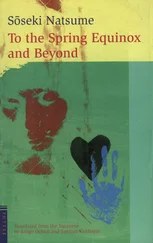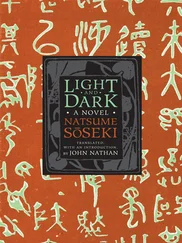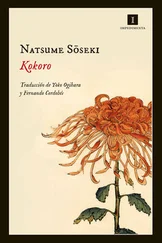Natsume Soseki - Kusamakura
Здесь есть возможность читать онлайн «Natsume Soseki - Kusamakura» весь текст электронной книги совершенно бесплатно (целиком полную версию без сокращений). В некоторых случаях можно слушать аудио, скачать через торрент в формате fb2 и присутствует краткое содержание. Жанр: Старинная литература, на английском языке. Описание произведения, (предисловие) а так же отзывы посетителей доступны на портале библиотеки ЛибКат.
- Название:Kusamakura
- Автор:
- Жанр:
- Год:неизвестен
- ISBN:нет данных
- Рейтинг книги:4 / 5. Голосов: 1
-
Избранное:Добавить в избранное
- Отзывы:
-
Ваша оценка:
- 80
- 1
- 2
- 3
- 4
- 5
Kusamakura: краткое содержание, описание и аннотация
Предлагаем к чтению аннотацию, описание, краткое содержание или предисловие (зависит от того, что написал сам автор книги «Kusamakura»). Если вы не нашли необходимую информацию о книге — напишите в комментариях, мы постараемся отыскать её.
Kusamakura — читать онлайн бесплатно полную книгу (весь текст) целиком
Ниже представлен текст книги, разбитый по страницам. Система сохранения места последней прочитанной страницы, позволяет с удобством читать онлайн бесплатно книгу «Kusamakura», без необходимости каждый раз заново искать на чём Вы остановились. Поставьте закладку, и сможете в любой момент перейти на страницу, на которой закончили чтение.
Интервал:
Закладка:
At last an answering voice is heard from the barn. The approaching steps pause behind the sliding door. It opens, and in an instant the dagger in its white wooden sheath is tumbling over the matting.
“A farewel gift from your uncle for you!†Nami announces.
I had no inkling of the moment when her hand went to her waistband. The dagger somersaults two or three times, then slides smoothly across the matting to Kyuichi’s feet. It has slipped a little from the loose sheath, to reveal an inch or so of cold glinting steel.
CHAPTER 13
It is the day of Kyuichi’s departure. We are accompanying him by boat down the river as far as Yoshida Station. Besides Kyuichi, our boat contains Mr. Shioda, Nami, her brother, Genbei, and myself, of course merely in the capacity of invitee.
I am happy to go along as “inviteeâ€â€”indeed, I am happy to go along without puzzling over reasons and roles at al . Prudence, after al , can play no part in the “nonemotional†journey.
Our boat is a flat-bottomed one, rather like a raft with sides added. The old man is seated in the middle, Nami and myself in the stern, and Kyuichi and Nami’s brother in the bow. Genbei sits apart, looking after the luggage.
“KyÅ«ichi, how do you feel about war?†Nami inquires. “Do you like it?â€
“I won’t know til I’m in it. There’l be suffering, I should think, but perhaps there’l be pleasures too†is his innocent reply.
“No matter the suffering,†the old gentleman remarks, “it’s for the sake of the nation.â€
Nami’s next question is equal y odd. “Surely you’re inclined to go to war and see what it’s al about, now that you’ve been given a dagger?â€
“Yes, I guess so,†Kyuichi responds with a light nod. The old gentleman laughs and tugs at his beard. His son pretends to have heard nothing.
Nami now abruptly thrusts her pale face close to Kyuichi and demands, “How are you going to be able to fight with that sort of nonchalant attitude?â€
“You’d make a fine soldier, Nami,†says her brother. These are the first words he has spoken to her. His tone indicates that the remark is not intended as a joke.
“Me? Me, a soldier? If I could become a soldier, I’d have done it long ago. I’d be dead by now. Kyuichi, you must die too. You’l lose your honor if you come home alive.â€
“Good heavens, hold your tongue!†exclaims her father. “No, no, you must return in triumph. Death is not the only way to serve one’s nation. I plan to live a couple of years yet. We’l be able to meet again.†The old man’s last drawn-out words tremble and are lost in tears; only the imperative of manliness prevents him from spil ing al that is in his heart. Kyuichi says nothing but simply sits with his head turned aside, looking at the riverbank.
There’s a large wil ow on the bank, and beneath it sits a man in a little boat moored to the tree, staring at his fishing line. As our boat goes by, trailing its rocking wake, the man glances up, and his eyes meet Kyuichi’s. No acknowledging charge flows between the two. The man’s mind is focused on his fishing, while Kyuichi’s busy thoughts have no space for so much as a single fish. Our boat floats calmly on past the unknown fisherman.
If you were to stand in the middle of the street, as a street-car director does, at the approach to Tokyo’s Nihonbashi Bridge, and stop every one of the hundreds who pass by every minute and learn each one’s trials and troubles, this world of ours would seem to you an appal ingly difficult place in which to live. We humans meet and part as strangers—if this were not so, who would be wil ing to take on the job of standing there directing the mil ing streetcars? It’s a lucky thing that our unknown fisherman seeks no explanation for Kyuichi’s tearful face. When I turn back to look, he is calmly watching his float. He’l likely go on sitting there, gazing at that float, until the Russian War is over.
The river is shal ow and quite narrow; the current flows gently. Our boat slips along through the water, moving inexorably on and on through the passing spring toward some other place, a place ful of noisy people who love to col ide with one another. This young man with the brutal mark of bloodshed upon his brow is drawing us mercilessly along with him. The bonds of fate are compel ing him to a dark and fearsome land far to the north, and we whose fate is tangled with his are likewise compel ed to travel with him until the ties that bind us at last give way. When this happens, something between us wil audibly snap; he alone wil be reeled inescapably in by the hand of his own fate, while we in turn are fated to remain behind. Beg and struggle though we might, he wil be powerless to draw us with him.
It is delightful how gently the boat floats on. Those must be field horsetails covering either bank; farther up are stands of wil ows. Here and there among them a low farmhouse reveals a thatched roof and a glimpse of a sooty window; occasional y a few white geese spil forth and waddle cackling into the river.
That flash of brightness between those wil ows must be a white peach tree in bloom. A loom knocks and clatters, and from within its rhythm the sound of a woman’s plangent singing drifts across the water; the song is impossible to recognize.
“Would you do a portrait of me?†Nami suddenly says to me. Kyuichi and her brother are deep in military talk, and the old man has nodded off.
“Certainly,†I say obligingly. Taking out my sketchbook, I jot down the fol owing poem and pass it to her: That silken obi
unraveled by the breeze of spring—
what name does it bear?
She laughs. “It’s no good just dashing something off like this. You must put a bit of care into it, and do something that reveals my temperament.â€
“I’ve been wanting to do the same thing myself, but somehow that face of yours just won’t compose itself into a picture the way it is.â€
“That’s a charming answer, I must say! So what should I do to get a picture?â€
“Oh, I could do one right now. It’s just that there’s something lacking. It would be a shame to draw you without it.â€
“What do you mean, lacking? It’s the face I was born with, so there’s nothing I can do about it.â€
“The face one’s born with can change in al manner of ways.â€
“You mean I can change it?â€
“Yes.â€
“Don’t treat me like a fool just because I’m a woman.â€
“On the contrary, it’s because you’re a woman that you say foolish things like that.â€
“Wel then, let’s see you make some changes to your own face.â€
“It already changes quite enough from day to day.â€
She fal s silent and turns away. The riverbanks are now level with the water, and the flat expanse of unplanted rice fields beyond is deep in flowering milk vetch. A vast sea of flowers stretches away forever, blurred with the haze of spring so that it seems a recent rain has half-dissolved those vivid dots of red and run them al together. Looking up, I see the towering form of a steep peak half-blocking the sky, with a wisp of spring cloud spil ed out across its flank.
“That’s the mountain you crossed.†Nami extends a white hand over the side of the boat and points to the dreamlike peak.
“Is Tengu Rock around there?â€
Читать дальшеИнтервал:
Закладка:
Похожие книги на «Kusamakura»
Представляем Вашему вниманию похожие книги на «Kusamakura» списком для выбора. Мы отобрали схожую по названию и смыслу литературу в надежде предоставить читателям больше вариантов отыскать новые, интересные, ещё непрочитанные произведения.
Обсуждение, отзывы о книге «Kusamakura» и просто собственные мнения читателей. Оставьте ваши комментарии, напишите, что Вы думаете о произведении, его смысле или главных героях. Укажите что конкретно понравилось, а что нет, и почему Вы так считаете.












